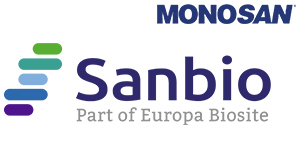Anti-ATP5H in Antibody Picoband™ (monoclonal, 6B12)
Anti-ATP5H in Antibody Picoband™ (monoclonal, 6B12)
Artikelnummer
SANMON23707
Verpackungseinheit
100μg
Hersteller
Sanbio / Monosan
Verfügbarkeit:
wird geladen...
Preis wird geladen...
Clone Number: 6B12
Immunogen: E.coli-derived human ATP5H recombinant protein (Position: A2-L161). Human ATP5H shares 81% and 78% amino acid (aa) sequence identity with mouse and rat ATP5H, respectively.
Concentration: Adding 0.2 ml of distilled water =f 500 μg/ml.
Format: Lyophilized
Storage buffer: Each vial contains 4mg Trehalose, 0.9mg NaCl, 0.2mg Na2HPO4, 0.05mg NaN3.
Additional info: Store at -20˚C for one year from date of receipt. After reconstitution, at 4˚C for one month. It can also be aliquotted and stored frozen at -20˚C for six months. Avoid repeated freeze-thaw cycles.Add 0.2ml of distilled water will yield a concentration of 500μg/ml. Background: ATP5H is also known as ATPQ. Mitochondrial ATP synthase catalyzes ATP synthesis, utilizing an electrochemical gradient of protons across the inner membrane during oxidative phosphorylation. It is composed of two linked multi-subunit complexes: the soluble catalytic core, F1, and the membrane-spanning component, Fo, which comprises the proton channel. The F1 complex consists of 5 different subunits (alpha, beta, gamma, delta, and epsilon) assembled in a ratio of 3 alpha, 3 beta, and a single representative of the other 3. The Fo seems to have nine subunits (a, b, c, d, e, f, g, F6 and 8). This gene encodes the d subunit of the Fo complex. Alternatively spliced transcript variants encoding different isoforms have been identified for this gene. In addition, three pseudogenes are located on chromosomes 9, 12 and 15. Subcellular Localization: Mitochondrion. Mitochondrion inner membrane. Tissue Specificity:
Immunogen: E.coli-derived human ATP5H recombinant protein (Position: A2-L161). Human ATP5H shares 81% and 78% amino acid (aa) sequence identity with mouse and rat ATP5H, respectively.
Concentration: Adding 0.2 ml of distilled water =f 500 μg/ml.
Format: Lyophilized
Storage buffer: Each vial contains 4mg Trehalose, 0.9mg NaCl, 0.2mg Na2HPO4, 0.05mg NaN3.
Additional info: Store at -20˚C for one year from date of receipt. After reconstitution, at 4˚C for one month. It can also be aliquotted and stored frozen at -20˚C for six months. Avoid repeated freeze-thaw cycles.Add 0.2ml of distilled water will yield a concentration of 500μg/ml. Background: ATP5H is also known as ATPQ. Mitochondrial ATP synthase catalyzes ATP synthesis, utilizing an electrochemical gradient of protons across the inner membrane during oxidative phosphorylation. It is composed of two linked multi-subunit complexes: the soluble catalytic core, F1, and the membrane-spanning component, Fo, which comprises the proton channel. The F1 complex consists of 5 different subunits (alpha, beta, gamma, delta, and epsilon) assembled in a ratio of 3 alpha, 3 beta, and a single representative of the other 3. The Fo seems to have nine subunits (a, b, c, d, e, f, g, F6 and 8). This gene encodes the d subunit of the Fo complex. Alternatively spliced transcript variants encoding different isoforms have been identified for this gene. In addition, three pseudogenes are located on chromosomes 9, 12 and 15. Subcellular Localization: Mitochondrion. Mitochondrion inner membrane. Tissue Specificity:
| Artikelnummer | SANMON23707 |
|---|---|
| Hersteller | Sanbio / Monosan |
| Hersteller Artikelnummer | MON23707 |
| Verpackungseinheit | 100μg |
| Mengeneinheit | STK |
| Reaktivität | Human, Mouse (Murine), Rat (Rattus), Monkey (Primate) |
| Klonalität | Monoclonal |
| Methode | Immunofluorescence, Western Blotting, Immunohistochemistry, Immunocytochemistry |
| Isotyp | IgG2b |
| Wirt | Mouse |
| Konjugat | Unconjugated |
| Produktinformation (PDF) |
|
| MSDS (PDF) |
|

 English
English







